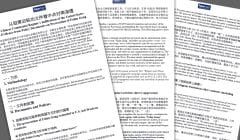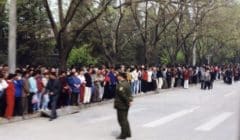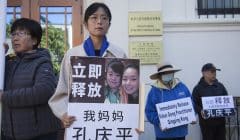2008 Beijing Olympics: Unveiling the Hidden Story

Photo of “Bird’s Nest” Stadium, located in Chaoyang District of Beijing; 36 of the 208 Falun Gong practitioners detained from Beijing were from Chaoyang District.
China hosted the 29th Olympic Games in Beijing from August 8-24, 2008. The opening night at the Bird’s Nest Stadium was described as a spectacular event that was reputed to transcend its predecessors in ‘numbers, colour, noise and expense’ according to The Guardian.
Few knew behind the fantastic displays, an equally dark story paralleled: the repression of more than 8,000 Falun Gong practitioners in China. The Olympian promise of “One World, One Dream”, would be denied to Falun Gong practitioners and a more brutal Chinese government would emerge in its aftermath.
Statistical Overview
*Statistics originate from Falun Dafa Information Center (FDIC), the Xinhua News Agency (Xinhua), the Congressional-Executive Commission on China (CECC), and Amnesty International (Amnesty)
● 500,000 yuan (approximately 70,000 USD)—offered as a reward by Beijing’s Public Security Bureau for information leading to the arrest of Falun Gong practitioners, among other “security threats,” during the Olympic period. (Xinhua)
● 8,000+—Falun Gong adherents detained across China between January and June 2008. (FDIC)
● 208—Falun Gong adherents were arrested in Beijing from January to June 2008 by public security agents from all 18 districts and counties in the municipality (FDIC).
● 104 —Falun Gong adherents who died from abuse or neglect in custody in 2008 (FDIC)
● 54—number of overseas Chinese Embassies that attended a briefing by the director of the military bureau for the Beijing Olympics’ security command center, tasked to prevent groups including Falun Gong practitioners from attending the Olympics (Xinhua).
● 31—number of provincial-level jurisdictions whose websites featured official reports of a pre-Olympics crackdown on Falun Gong (CECC)
● 25 —number of Falun Gong practitioners who were reportedly arrested in Xinjiang in a crackdown on underground publishing operations in July 2008. (Xinhua)
● 13—number of years in prison that Liu Fengmei, a resident of Jinzhou city, Liaoning province, was sentenced to within days of the Olympics closing ceremony, because of her practice of Falun Gong (FDIC)
● 11—number of days Mr. Yu Zhou, a popular folk musician, was detained for at the Tongzhou District Detention Center before he was killed for his belief in February 2008 (Amnesty).
● 10—number of Falun Gong adherents are confirmed to have died during the 16 days of the Olympics alone (FDIC).
● 8—the average number of years Falun Gong adherents were sentenced to in the aftermath of the Olympics (FDIC).
Pre-Olympic Campaign
The murmurs of an Olympic campaign were heard in 2005 and in March 2007, a massive campaign was launched to silence Falun Gong practitioners and other entities labeled as “undesirables” by the Chinese Communist Party.
According to information obtained by Amnesty International, Chinese Minister Zhou Yongkang issued the following order in the context of “successfully holding the 17th Communist Party Congress [in October 2007] and the Beijing Olympic Games”:

“We must strike hard at hostile forces at home and abroad, such as ethnic separatists… and ‘heretical organizations’ like the Falun Gong,”
In July 2007, the Xinhua News Agency (official press office of PROC) reported on a briefing given to defense attaches from 54 of China’s overseas embassies by Tian Yixiang, director of the military bureau for the Beijing Olympics’ security command center.
According to the article:
“…the PLA will be responsible for managing border control and to stop East Turkistan…organizations, Falun Gong adherents, and Tibetan separatists from getting into the games.”
Statements by other top officials, as well as an internal document, also indicated that Falun Gong adherents from both inside and outside China would be excluded from participation in the 2008 Beijing Olympics, as athletes, coaches, journalists, or spectators.
The Congressional-Executive Commission on China noted: “Official accounts of the [pre-Olympic] crackdown were publicly available on Web sites for all 31 of China’s provincial-level jurisdictions in 2007–2008.”
The highlight of the meeting held by Chen Sumin of the 610 Office, an extra-legal task force charged with leading the campaign against Falun Gong in January 2008 was that


“Each community should treat all work items of the 610 Office with a great sense of responsibility and importance, and not give Falun Gong practitioners any opportunities… In particular, [we should] mobilize the power of the masses of residents, [asking them to] report promptly if they find anyone handing out [Falun Gong related] materials.”
In many cities, a reward system was put in place offering money for identifying Falun Gong adherents to the authorities. Reuters reported that Beijing police were offering rewards of up to 500,000 yuan ($73,150) to people who provide tip-offs during the Olympics, among other targeted groups named was Falun Gong.
Representative Cases
The following cases offer a glimpse of the human cost of the Olympics.
Popular Singer and Wife Arrested at Olympic Checkpoint, Former Dies Within Days
On January 26, 2008, Yu Zhou and his wife, poet and artist Xu Na, were coming back from a Residents of the Valley concert, a popular folk ensemble that Yu was a member of. They were stopped at an Olympic checkpoint in Beijing, and were arrested after police searched their car and found Falun Gong leaflets in her car.

The couple were then taken to separate detention centers.
Eleven days later, Yu’s family was told to come visit Yu at the hospital. When they arrived, they were shocked to find the 42-year-old had died as upon being detained Yu had been healthy. Authorities, claimed he died from diabetes or a hunger strike. However, it is more likely more serious persecution was at play, as they prevented Yu’s family seeing his body, covering his body with a white sheet except for his eyes, and refused to hand over the body to the family.
Xu Na was unable to attend Yu’s funeral and sentenced to three years in November 2008.
Sister of U.S. Citizen Arrested for His Participation in Falun Gong Activities
At 8 am on April 22, 2008, 36-year-old Si Miao and her father, Si Shilin, were arrested for her brother’s partaking in Falun Gong activities in the United States.

Si Miao was the Chief Financial Officer at the Institute of Energy Research at the Chinese Academy of Sciences. She was described by others as an upright and kind person, being well regarded by her coworkers and community. She learned about Falun Gong in 1999 through her brother Si Yang, a U.S. citizen residing in Los Angeles, and practiced privately in her home.
Because of the great success of Falun Gong practitioners’ efforts in clarifying the facts about Falun Gong abroad, State security agents in China ordered police to arrested Si Yang’s sister and father in attempts to coerce him to stop participating in Falun Gong related activities in the U.S.
Although the Si siblings’ father would be released, he would be placed under strict house arrest alongside his wife and Si Miao’s husband. Their IDs and passports confiscated by authorities. Si Miao was also sentenced to 1.5 years at Shijiazhuang Women’s “Re-education through Labor” Camp after 30 days of interrogation and sleep deprivation.
Prelude to Opening Night: 55-year-old Artist Dies From Severe Internal Injuries
A painter from Hunan province, arrested in a nationwide pre-Olympic roundup of Falun Gong adherents. Detained in March, an emaciated Mr. Hu Heping from Yueyang city died August 7, 2008, a day before the Olympic opening ceremony in Beijing.

“Hu’s case is typical of the pattern of arrests and abuse in custody we’ve seen in the run-up to the Olympics,” says Erping Zhang, Falun Dafa Information Center spokesperson. “While the world was preparing to watch the opening ceremonies, this man who was healthy in March was dying in his bed because of vicious treatment meted out by Chinese police.”
According to sources inside China, Hu was tortured while in police custody at the Yueyang City’s No.1 Detention Center, causing serious injuries to his internal organs and swelling to his feet and legs. He was seen coughing constantly, while his weight dropped from 120 pounds to 90 pounds. During his detention, Hu’s family was denied access to visit him by agents of the State Security Bureau and the 6-10 Office, an extralegal taskforce with the mandate to oversee the handling of Falun Gong cases.
Nearly three months after his arrest, on June 16, 2008, Hu was in critical condition. Doctors found that his internal organs were severely injured and that he suffered from extensive liver damage. Although Hu was released two days later, his condition was beyond repair. He died on the morning of August 7, 2008.
Final Push: Penetrative Effort, Mass Arrests Including Detainment of Two Minors
In the final four months leading up to the Olympics, the central government 6-10 Office again issued directives to local governments nationwide to ensure “security for the Olympics”.

The Hengshui City 610 Office of Hebei province offers an idea of how penetrative campaigns are. This 610 Office sent secret documents to every county, city, district, and department under its jurisdiction. Orders further traveled down to the local level in different townships, towns, and departments,
To further ensure complicity, chief leaders from every unit of the Hengshui Municipal Party were told by their committee secretary Jing Chunhua that they would be fired if any practitioner from their unit went to Beijing and Qinhuangdao to appeal for justice for Falun Gong during the Olympics.
Beginning in May and continuing into the Olympics, there would be an increased number of mass arrests all over China.
In Xingtai City, Hebei Province, a family of five Falun Gong practitioners and their visiting guests would be arrested on June 17, 2008. The elderly and the young were not spared, as an elderly lady in her 70s and two twin girls, aged 17, were arrested.
The girls, Wang Hui and Wang Tong, were threatened sentencing in July and were deteriorating quickly in the month in their arrest. No news has been heard from them since, but the family has been charged with producing Falun Gong informational materials.
Impact and Implications


“the international community must remember the victims of the CCP’s crackdown who are still imprisoned and continue to call for their release—before it’s too late.”
In the nine months leading up to the 2008 Olympics, at least 8,037 Falun Gong adherents had been arrested across 29 provinces, major cities, and autonomous regions.
The impact of China’s Olympic campaign could still be felt in 2016, at the opening of the Rio Games in Brazil. Thousands of Falun Gong practitioners and their families lived in the aftermath of the crackdown.
While Falun Dafa Information Center estimated at least 150 people detained at the time were still imprisoned, many with eight-year terms, the most common length term given, have been excluded. They either did not survive their prison terms, passed away after being taken to forced labor camps, or died soon after release due to delayed medical attention.
“These innocent Chinese people were abducted in advance of the 2008 Olympics simply because they practice Falun Gong. Today, they continue to languish in prisons across China,” says Levi Browde, Executive Director of the Falun Dafa Information Center.
Continued international pressure led to lighter treatment and the early release of Bu Dongwei admist the Olympic roundup, but he is one of the lucky minority.
“They [Falun Gong adherants] are at constant risk of horrific torture and even death. And we must remember this is just the tip of the iceberg of the hundreds of thousands of practitioners imprisoned over the years and the tens of millions persecuted for their faith across China.”
“It may be years before the world fully understands the true human cost of the 2008 Beijing Olympics,” says Browde. “But even without such knowledge, the international community must remember the victims of the CCP’s crackdown who are still imprisoned and continue to call for their release—before it’s too late.”
Further Reading:











